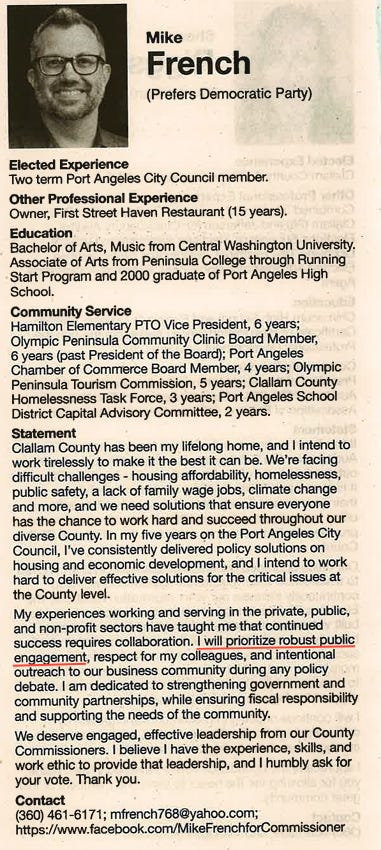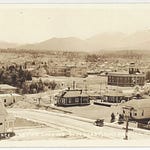Commissioner Mike French campaigned on transparency and public engagement—but many Clallam County residents are wondering where that commitment went. From unanswered emails to coordinated policy rollouts with minimal public input, recent actions raise serious questions about whether ideology is replacing dialogue. Examine the growing disconnect between the county’s stated values and how decisions are being made—quietly, selectively, and too often behind the scenes.
Back when Mike French was a Port Angeles City Council member, a concerned citizen wrote a letter to the Peninsula Daily News with a cautionary tone. The letter alleged that Councilmember French attempted to bypass the standard public process on a downtown parking decision—without first consulting businesses, first responders, or members of the disabled community. The writer concluded that the move “showed disrespect for the whole community.”
It’s a moment worth revisiting—not out of hostility, but out of concern that the patterns described then may still be unfolding today, only now on a broader scale.
When Commissioner French later ran for Clallam County Commissioner, he seemed to acknowledge the importance of public trust and input. In his official voter pamphlet statement, he pledged: “I will prioritize robust public engagement.”
Unfortunately, that commitment hasn’t been reflected in recent practice. Over the past nine months, there have been no regular opportunities for citizens to engage in two-way dialogue with their county commissioners. No town halls. No listening sessions. No meaningful public Q&A. While the public is invited to make comments during meetings, those comments are rarely met with responses—particularly if the questions raise criticism or challenge the direction of policy.
Emails often go unanswered, and when responses are given, they tend to arrive only when they affirm a narrative already in motion.
The culture tax: process matters
One recent example is the proposed “Culture Tax,” a new sales tax initiative introduced by Commissioner French, framed as a way to bring art and therapeutic programs into jails and to allocate funds to NGOs for programs such as teaching children to fish.
However, leaked emails from within the arts community painted a more coordinated—and less transparent—picture of how the policy was expected to advance.
“If those Commissioners whom I’ve spoken with maintain the support they have offered me, we may be in the final stretch of this new initiative becoming a reality,” one email read.
Another noted:
“A Commissioner requested that we have 2-3 people present to make public comments in support of the initiative at each of these meetings…”
When asked which commissioner had encouraged supporters to speak at public meetings, Commissioner French said he couldn't recall. For a sitting commissioner involved in promoting the initiative, that answer raises eyebrows. At best, it suggests a troubling lack of transparency. At worst, it implies a coordinated effort to shape public perception while sidestepping honest community input. Either way, it leaves constituents questioning whether the “Culture Tax” was truly public-driven—or quietly orchestrated behind closed doors.
These are fair questions. And they deserve fair answers. Especially since the commissioners refuse to indicate whether the culture tax has been abandoned.
Public service vs. personal ideology
During a recent Charter Review Commission meeting, Commissioner French explained his philosophy this way:
“If the voters elect commissioners that have a strong opinion… then that’s what the voters wanted… if we advocate for those positions while we’re serving on boards, that’s what the voters wanted.”
That may reflect a sincere belief. But it also raises concerns about how Commissioner French interprets the role of an elected official. Does election to office give a commissioner a mandate to pursue their own ideological direction, even if it drifts from the campaign promises or excludes ongoing public feedback?
If public engagement is seen as optional—and not essential—then local government risks becoming insular and disconnected.
The Board’s values
The Board of Commissioners has a clear set of values published on its website. Among them:
“Putting the translated desires of our residents into action through effective communication”
“Providing comprehensive and exemplary public service levels in a prompt responsive manner”
Maximizing and enhancing our environmental resources for sustainability and legacy expectations
“Celebrating the diversity and inclusiveness of our residents’ contributions to our quality of life”
These are admirable goals. But in order to fulfill them, elected officials must do more than listen to voices that agree with them. They must welcome dialogue, even when it’s uncomfortable. They must answer questions, even when the answers aren’t easy. And they must remember that public trust isn’t given—it’s earned, and re-earned, every day.
Moving forward
Commissioner French is clearly passionate about policy and committed to a vision for Clallam County. That’s not in question. But the manner in which that vision is pursued matters just as much as the vision itself. Transparent process. Honest engagement. Respect for differing views. These are the cornerstones of good government.
The public isn’t asking for perfection—just participation. And the kind of open, responsive leadership that was promised during the campaign.
What Residents Can Do:
Attend public meetings and ask respectful but direct questions.
Request regular public forums or town halls with Q&A.
Insist that campaign promises—like prioritizing public engagement—are not treated as optional.
Have a message for the Board of Commissioners? All three can be reached by emailing the Clerk of the Board at loni.gores@clallamcountywa.gov













